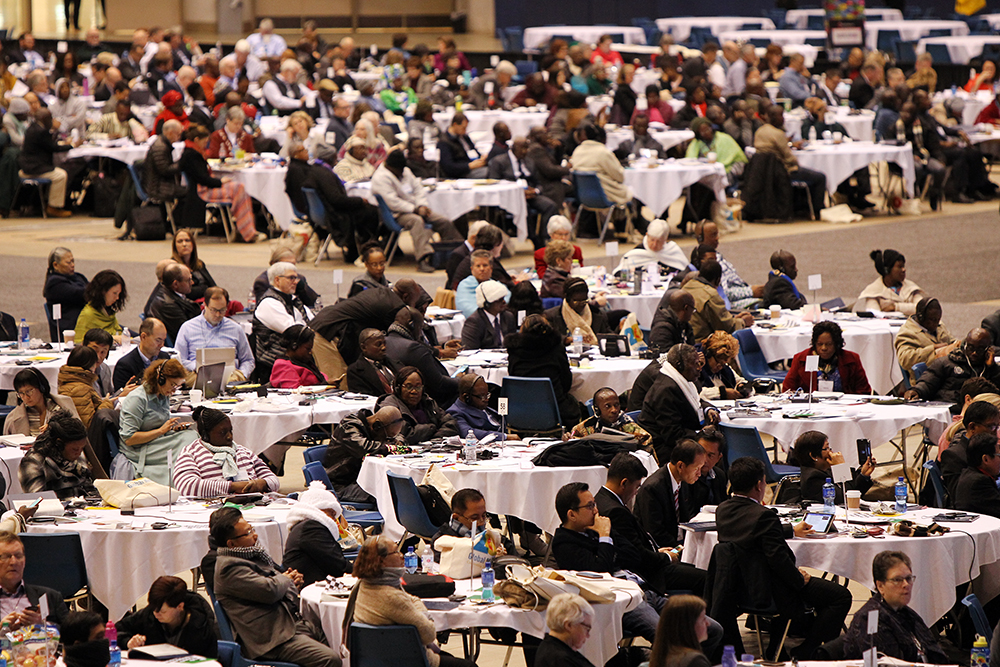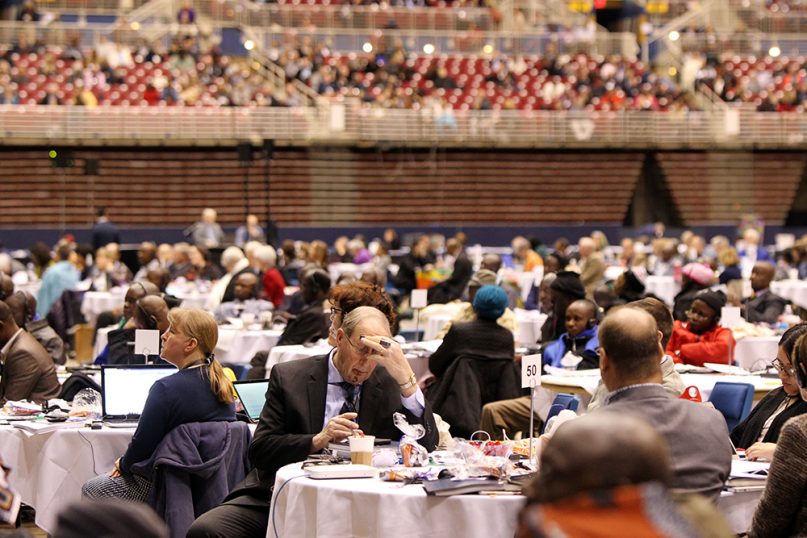(RNS) — United Methodist Church officials admitted this week that some of the votes cast during its recent special session on sexuality may have been invalid.
During a special session of the UMC General Conference in St. Louis, Missouri, which met last month, delegates from the largest mainline Protestant denomination made headlines for backing measures to strengthen bans on LGBTQ clergy and same-sex marriage.
However, an independent review of credentials, name badge barcode scans, seating records, attendance forms and other records was conducted after the meeting raised concerns.
“Upon completion of the review, it appears possible that a very limited number of ineligible persons who were correctly denied credentials by General Conference staff were later able to procure them,” the UMC’s Executive Committee of the Commission on the General Conference said in a statement released on Thursday (Mar 14).
But it remains unclear as to how — or even if — the church will respond to the reports of irregularities and whether church bodies properly handled other allegations of voting impropriety.
RELATED: United Methodists pass Traditional Plan, keep ban on LGBTQ clergy, same-sex marriage
The review was prompted by an inquiry from The New York Times, which reported that at least four ballots were cast by individuals who were not authorized to do so, pointing primarily to irregularities among a handful of delegates from Africa from the pool of more than 800 delegates at the conference.
Among the delegates whose credentials are being questioned in Philippe Kasap Kachez of the South Congo Episcopal Area, according to the United Methodist News Service.
Kasap Kachez’s father, Bishop Kasap Owan of South Congo, said his son was listed as a reserve delegate and filled in for another delegate who had visa problems and could not be in St. Louis. Owan, who opposes ordaining LGBTQ United Methodists, pointed to a list of elected delegates and reserves from his area he said General Conference officials had before the meeting started.
The Rev. Gary W. Graves, secretary of the General Conference, told UMNS that list is part of its review.
Four votes would not overturn some of the most consequential votes of the conference, such as the adoption of the “Traditional Plan” — a reinforcement of the UMC’s ban on same-sex marriages and “self-avowed practicing” gay clergy — which passed 438-384.
Other votes passed by much slimmer margins: the vote dealing with legislation that could allow churches to leave the denomination while keeping church property passed by 402-400. The constitutionality of that measure under church law — irrespective of the vote itself — is already in question and set to be reviewed alongside other measures by the UMC Judicial Council in April.
Church officials say they are concerned about the possibility that improper votes were cast.
“We take the integrity of the legislative process very seriously, and the breakdown in the process is troubling,” Rev. Gary W. Graves, secretary of the General Conference, said in a statement.
When Religion News Service pressed Graves for more details such as how many individuals are believed to have voted improperly, why they were allegedly allowed to vote anyway, and how this will impact the votes themselves, he said such questions “will be considered by the Commission and will be part of their report and next steps.”
The Rev. William B. Lawrence, a former president of the UMC’s Judicial Council, explained that the path forward for dealing with possible invalid votes is unclear. The Commission on General Conference is an interim body that does not hold the same power as the General Conference itself.
“Regardless as to what the allegations may involve, the complications are that the General Conference is in charge of its own rules, and the General Conference only exists when it is in session,” he said.

Delegates attend the first day of deliberations at the special session of the United Methodist Church General Conference in St. Louis on Feb. 24, 2019. RNS photo by Kit Doyle
The commission could send the matter to the UMC Council of Bishops for more direct action. The bishops could then ask the denomination’s Judicial Council to weigh in, call a new special session, or conclude that the matter should be addressed at the next scheduled General Conference in 2020.
Lawrence said calling a new special session is unlikely, but delaying the matter until 2020 would carry complications of its own.
“When General Conference next convenes, it won’t necessarily be the same people,” he said, explaining that the delegates would change.
RELATED: ‘In this to the end’: LGBT United Methodists express hurt, hope after vote
The discussion of voting irregularities follows a separate allegation made during the conference itself. Florida Conference delegate Carlene Fogle-Miller requested that the General Conference Committee on Ethics investigate rumors of “vote buying” on the floor. Her proposal to send the matter to the committee passed 417-388.
Fogle-Miller told RNS via Facebook message that while her original concerns were different from the new revelations, she “would not be surprised if there was some connection.”
Kasap Kachez of South Congo, who has been accused of voting when he wasn’t eligible, told UMNS that an official translator for the special session asked him to offer other African delegates $100 to vote for the One Church Plan during the General Conference. That plan, which was rejected by delegates, would have allowed individual churches and conferences to decide whether to ordain and marry their LGBTQ members.
The translator has denied the allegations, according to UMNS.
The General Conference Committee on Ethics eventually produced a four-sentence report on the vote-buying allegations, saying officials “brought in several people for conversation” but that “at this time, the committee is unable to substantiate the allegation.”
However, Lawrence said that at least one member of the ethics committee told him that “the ethics committee, as a practical matter, did not even meet,” raising questions as to whether the situation was given adequate attention.
“It’s unclear whether the matter referred to the Committee on Ethics was taken seriously by the Committee on Ethics,” Lawrence said.
Graves disputed that account in an email to RNS.
“The Committee on Ethics was convened and did have a quorum,” he said. “They are a committed and gifted group of leaders and I trust they did the best work they could do. They received statements from a number of persons. … The matter being taken to the Commission on the General Conference is not the same matter.”
The controversy is hardly the first in UMC history, as allegations of voting improprieties at General Conference date back to at least 2008, when the ethics committee was created following allegations of improper voting techniques that year. According to UM News, delegates expressed discomfort with a group that provided free cell phones to African and Filipino delegates, arguing they could be used to tell people how to vote.
The coalition that provided the cell phones denied that was the case, arguing they were simply trying to provide delegates access to technology.
(This story has been updated.)





